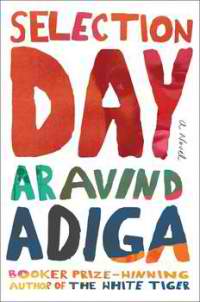
Published in the UK in 2016; published by Scribner on January 3, 2017
Selection Day seems to be a light comedy about a father, his two sons, and their passion for cricket until it becomes a more serious coming-of-age novel. I didn’t think much of the last Aravind Adiga novel I read, but I’m giving this one full marks.
Radha Krishna Kumar is the finest young batsmen in Mumbai, and his brother Manjunath is nearly as good. That, at least, is the opinion held by Parmod Sawant, the head cricket coach at an international school, although Pramod must defer to Tommy Sir, the best talent scout in India. Plans are afoot, not all of them legitimate, to invest in the two brothers, as Anand Mehta proposes to act as agent for (and owner of) the two cricketeers while pocketing the profit from their success.
The boys attained their lofty status thanks to their father, Mohan Kumar, a seller of chutney who has devoted his life to teaching the boys useless proverbs, correct posture, and the fundamentals of cricket. The boys, of course, resent their controlling father, in part because he caused their mother to flee. Cricket seems to be their only hope of a better life.
A rivalry between young Manju Kumar and his older brother develops as the novel progresses. But when Manju befriends another young cricket player, Javed Ansari, his thoughts turn to poetry and music and college and everything that is not cricket. Is he being led astray, or is being encouraged to find his true destiny? In the coming-of-age tradition, Manju finds himself pulled in several directions at once as he tries to decide how to live his life.
Many of the characters in Selection Day play familiar comedic roles — particularly the father, Tommy Sir, and Anand Mehta — and much the novel is quite funny. Comedy aside, the relationship between Javed (a Muslim) and Manju (a Hindu) explores serious questions involving religion, sexuality, and social status in India.
Adiga uses cricket to open a window into India’s problems, which he sees as corruption, prejudice, resistance to modernization, and a tendency toward self-delusion, among other issues (including literary offenses committed by Indian authors who meet the shallow demands of the reading public). At the same time, the book has universal appeal, revealing character traits (vulnerability, manipulation, self-aggrandizement, empathy) that are recognizable in all cultures.
Whether Manju makes the right choices in his life is, of course, something that only Manju can judge, but the end of the book gives the reader a peek at Manju’s young adulthood. That invites the reader to ponder how Manju’s life might have turned out if he gone in a different direction. The ending isn’t what I might have predicted and it is all the more satisfying for that reason.
I should add that this is not the first novel I’ve read in which cricket plays a dominant role, and I still don’t have the foggiest idea how the game is actually played. Fortunately, a reader doesn’t need to understand cricket to understand Selection Day. And for those who care, Adiga appended an amusing glossary of cricket terms.
RECOMMENDED